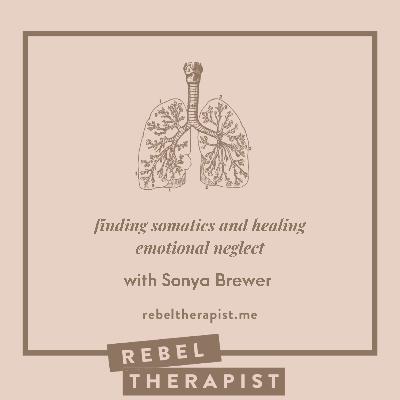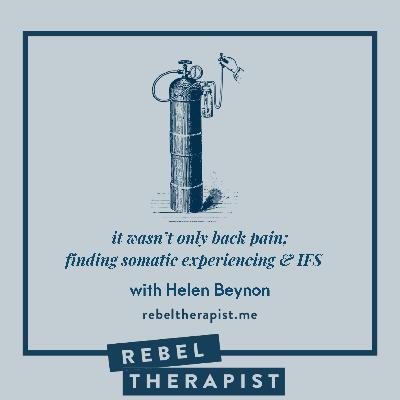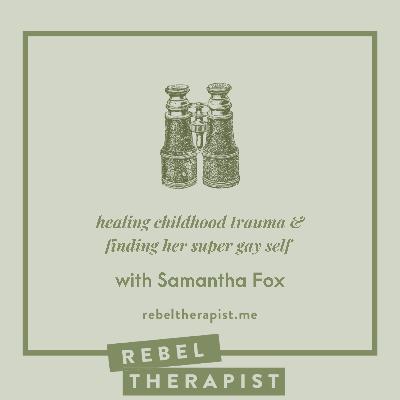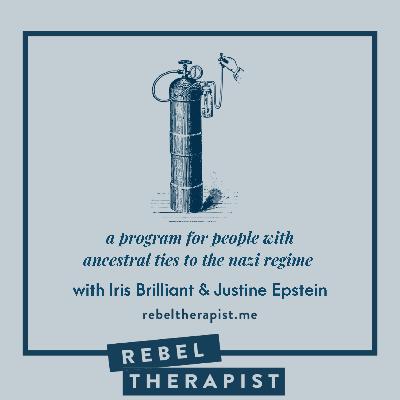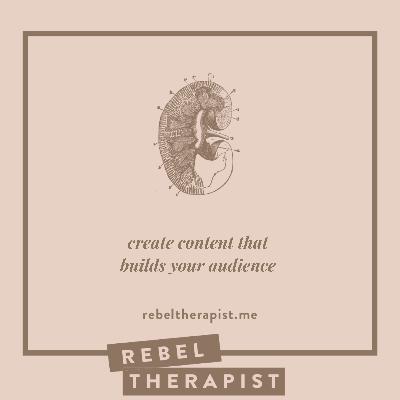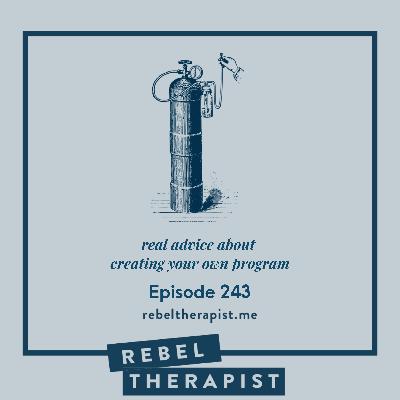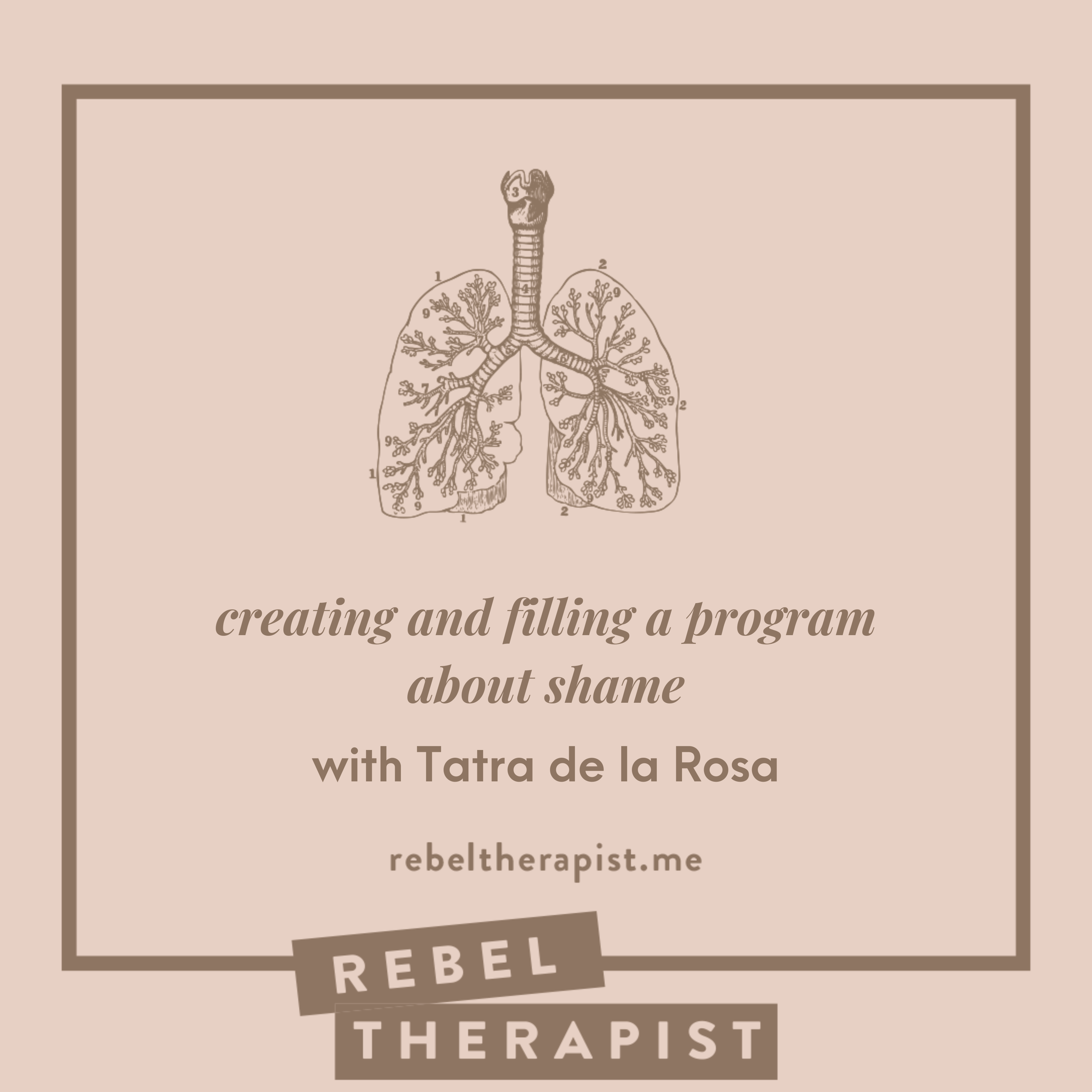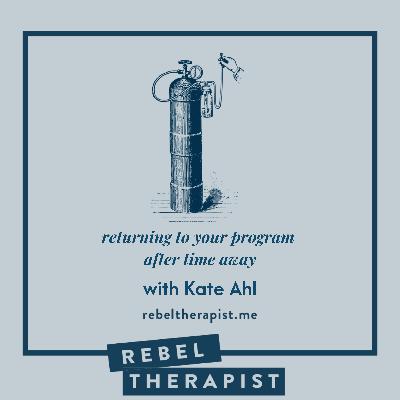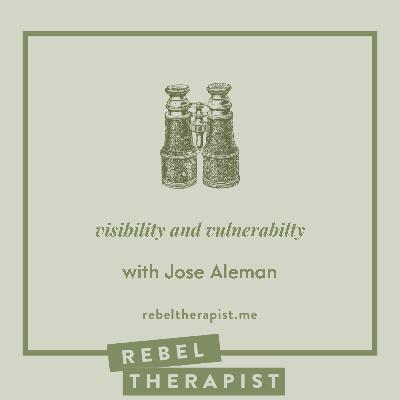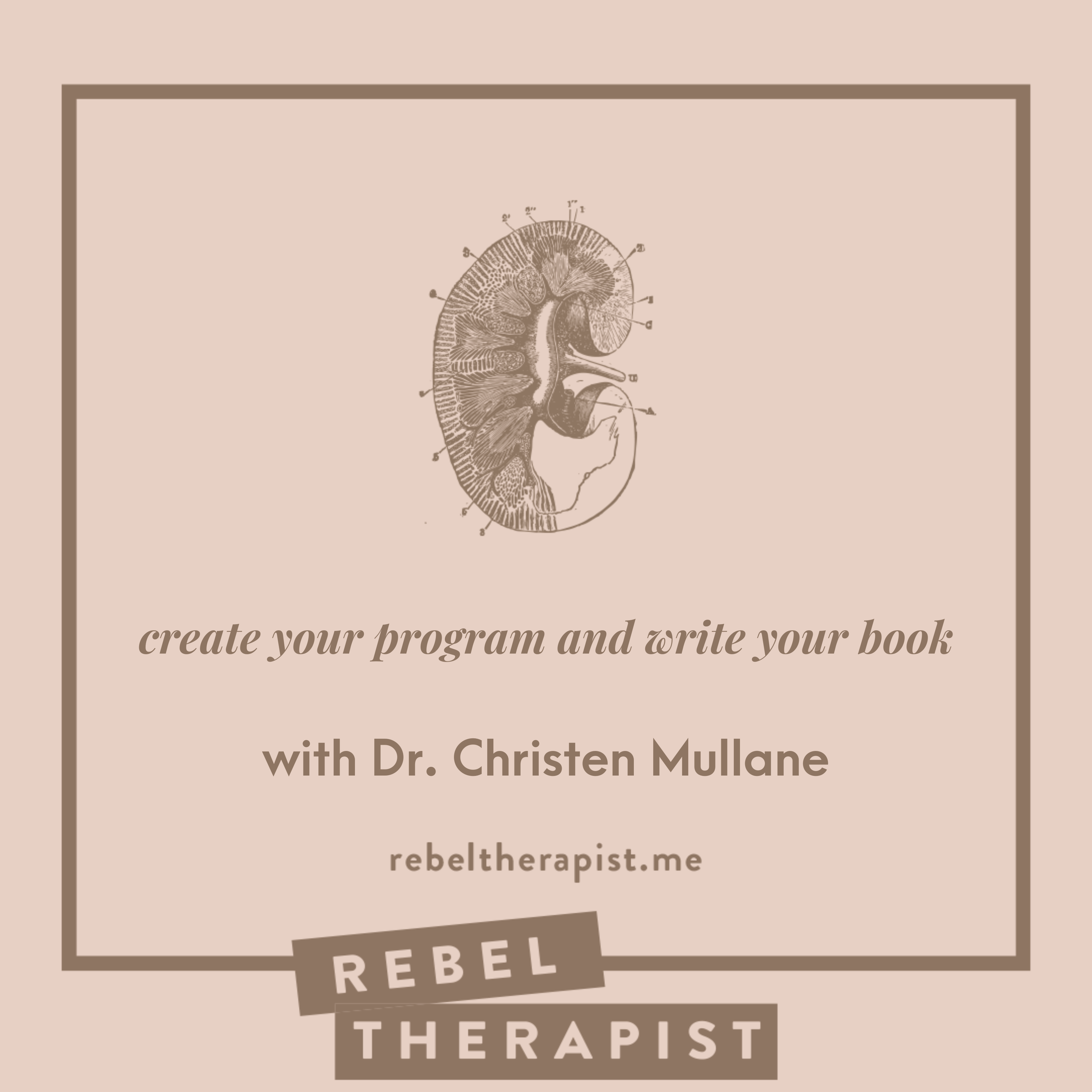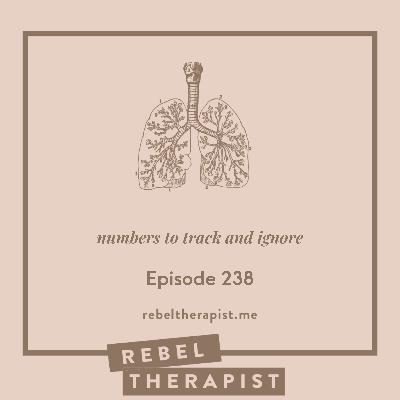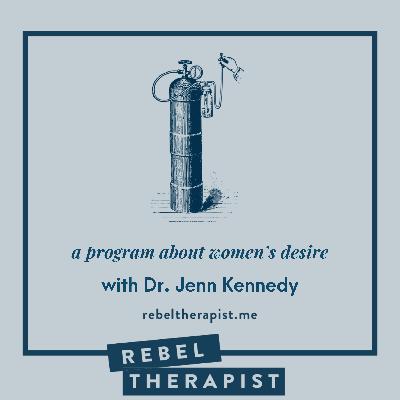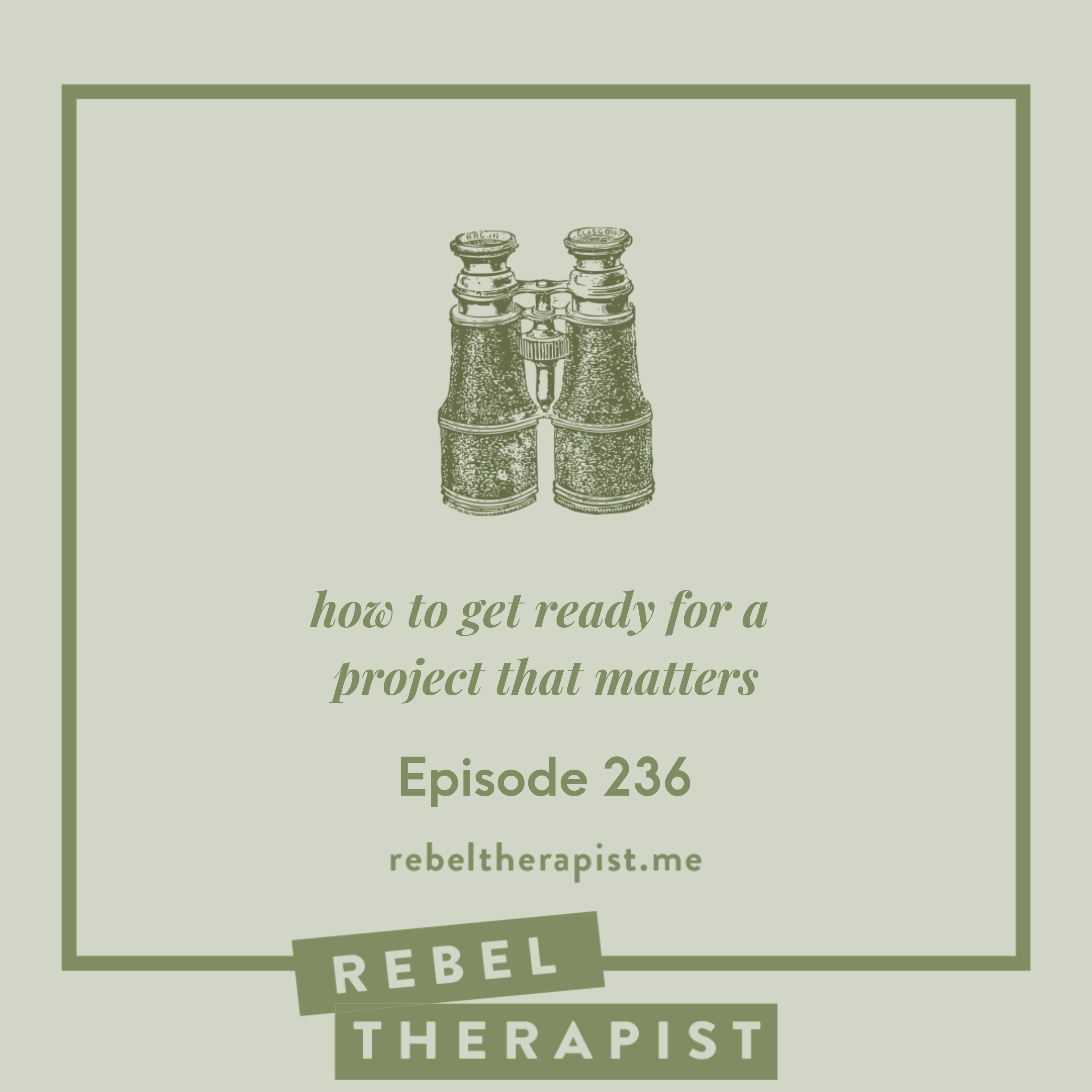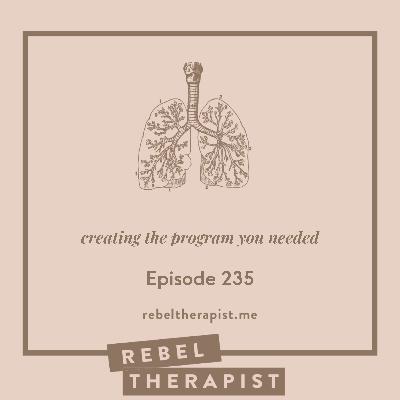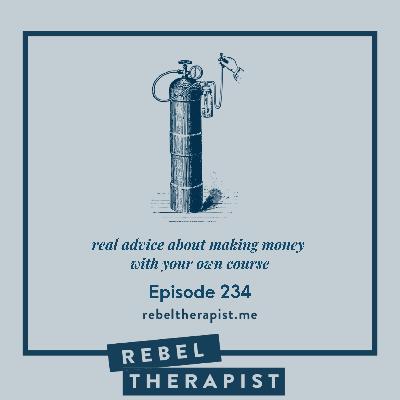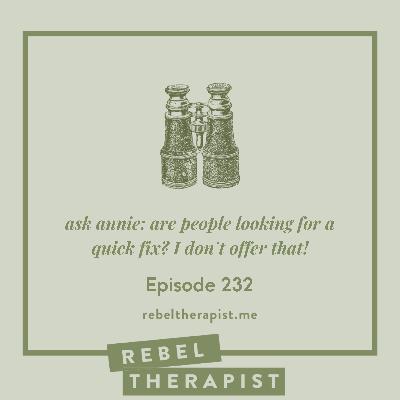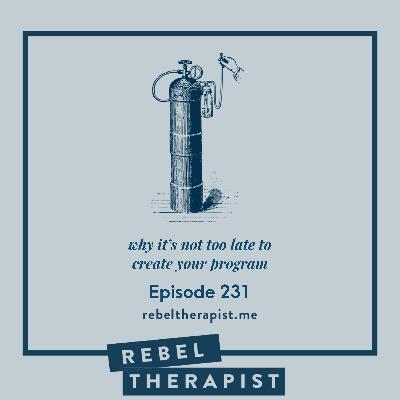Discover Rebel Therapist
Rebel Therapist

Rebel Therapist
Author: Annie Schuessler
Subscribed: 294Played: 6,104Subscribe
Share
Description
Rebel Therapist is the podcast where you'll get support in being a therapist entrepreneur. I'm Annie Schuessler, therapist and business coach and strategist for therapists. I'll support you in taking your work beyond the therapy room to make an even bigger impact. I interview Rebel Therapists who are already doing work beyond the therapy room, from running workshops to writing books to creating online courses. You'll hear about how they created their unique businesses, the mindset work they've done, and the mistakes they've made along the way. Get the inspiration and information you need to be a Rebel Therapist, starting now.
257 Episodes
Reverse
Sonya Brewer is a trauma specialist and relationship expert who specializes in creative life and relationship design for overachieving trauma survivors and their partners. She helps trauma survivors feel more alive, connected and authentic so they can create the lives and relationships they truly want. In this conversation Sonya shares vulnerably about doing her own deep work, including the processes she went through to heal her childhood emotional neglect and other traumas. She also talks about how her own healing has changed her work as a therapist and healer. Here's some of what we talked about: Discovering Breath Work and somatics Finding the right therapist and sticking with her for decades! Becoming a healer and leaving corporate behind Healing and retrieving young parts of herself Understanding and healing from emotional neglect Feeling the help, love and healing of her ancestors The limits of talk therapy in accessing some of our deepest healing Insights on Couples and Complex PTSD (and an upcoming book!) Show notes at https://rebeltherapist.me/podcast/250
You’re going to hear some courageous and vulnerable stuff right now. My guest today is a therapist who uses two methods to help her clients heal trauma. Her own healing journey started in an unexpected way. Helen Beynon is a somatic therapist and IFS-informed practitioner. She loves working with folks to transform trauma and build their capacity to navigate a tumultuous world. I met her when she was a teacher in my IFS learning. She’s based in British Columbia. Here's some of what we talked about: How she found Somatic Experiencing as a client Doing deep emotional and physical healing she didn’t expect Her personal experiences that led her to learn both IFS and Somatic Experiencing as a practitioner How she integrates the 2 methods How she now listens to and uses her anger rather than pushing it away Show notes at https://rebeltherapist.me/podcast/249
Before I jump in, I want to share a workshop I’ll be running for people who are estranged or distant from their parent or caregiver and are needing support while they work to create a beautiful life and heal. This is a judgment free zone where you’ll be with people who get it, and you’ll learn tools to truly show up for yourself. Join me on Friday, August 1st. Go to https://anniezam.com/ to learn more and sign up. I can’t wait to see you. On to today’s interview! Today’s guest shares deeply and vulnerably how she’s done her own healing through big stuff, including childhood sexual abuse, realizing she’s a lesbian while married to a man, and the death of her father. You’ll hear about the beautiful process she guides people through, why she took a sabbatical recently, and why she’s working with a shaman now. Meet Samantha Fox. As a sexuality coach, she works with women around the world to support them as they discover that they are not as straight as they might have thought. She’s developed an experiential method called Unbox Your Sexuality that creates a monumental transformation. She’s also an LMFT in New York. Here's some of what we talked about: How therapy failed her at one point Healing from childhood trauma Uncovering her lesbian sexuality Becoming a guide for other women in their coming out journeys Coping and growing in the loss of her father Taking a sabbatical Why she’s working with a Shaman How she changed her work to feel more right for her The power of IFS and why she uses it with her clients Show notes at https://rebeltherapist.me/podcast/248
This podcast is changing because my work is changing! I’m still offering business coaching, and you can find out how I help therapists and healers with their businesses at rebeltherapist.me. AND I’ve stepped back into working with clients as a healer. I have been on a HUGE healing journey of my own that started with a guided psychedelic journey in January of 2023. I then received Brainspotting, first from my friend, Alicia Taverner. Hire her if you can. She’s at *https://www.ranchocounseling.com/.* Then I received some parts work. I have gotten so much help from these modalities. They really get to the root of my trauma in a way that nothing else has. I felt this magnetic pull to learn these modalities myself and to start working as a healer again. I work with people who are estranged from a parent or caregiver and other folks who want to do some big healing. I also have a workshop coming up later this summer for people who are estranged from a parent or caregiver and are working to build their most beautiful life. If you’re interested in checking out any of that, find it at AnnieZam.com. Let’s get to today’s amazing therapist guest who I adore. My favorite kind of practitioner is the kind that wouldn’t ask their client to do anything they don’t do themselves. I’m SO excited to introduce Jaclyn Tyson, a therapist and spiritual companion who helps people reconnect with their inner wisdom through spirituality, creativity, and healing practices. She weaves together approaches like Brainspotting, parts work, energy healing, and expressive arts to support personal and collective transformation. In our conversation, you’ll hear about how she uses these modalities with her clients AND how they’re central to her own growth and healing. Here's some of what we talked about: How Jaclyn processed her grief after her father passed and she knew she needed something beyond the tools she already had Jaclyn’s mentorship with a Shaman How she brings Reiki, Brainspotting and IFS together all at once with her clients The rituals she does before and after sessions Show notes at https://rebeltherapist.me/podcast/247
My 2 guests today created and will co-facilitate The Hour Before Dawn A Program for Inheritors of Wealth with Family Ties to the Nazi Regime who want to take ancestral responsibility and create a more just world. (https://www.irisbrilliant.com/the-hour-before-dawn) Iris Brilliant is a money coach based in Berlin, Germany. She guides wealthy people who are confused or conflicted about what to do with their money to create a deeply liberating vision and plan for their wealth. She has recently shaped her career to fight fascism globally. Justine Epstein is a facilitator and mentor for people with inherited wealth who want to examine the histories of their ancestors and money, and take meaningful action to address these legacies. Her approach combines ancestral research, contextual history, political education, wealth redistribution and divestment, with embodied mindfulness, ritual, connection to the natural world, and creative expression. They both come from wealthy families. You’re about to hear how they’ve done intense personal work AND justice work. I’m swooning on that combination and it’s a combination of work I aspire to do. You’ll hear me ask them some challenging questions. You know, the stuff people who have wealth don’t usually talk about in public? They talk about that stuff with a ton of transparency. I think it’s courageous. Here's some of what we talked about: Iris and Justine’s journeys with generational examination and healing around wealth Navigating wealth and relationships Shame, guilt, and transformative healing and action Building their collaborative partnership Creating and facilitating their program: The Hour Before Dawn Addressing the Palestinian genocide Show notes at https://rebeltherapist.me/podcast/246
I’ve been regularly creating content to build and nurture my audience for 10 years now. This strategy has worked really well for me. It’s been a huge part of how I’ve drawn people to my work and built their trust. My content has also helped thousands of people who I’ll never have the pleasure of meeting. AND…creating content week after week can be overwhelming. Daniel Fava had me on his podcast, Private Practice Elevation, and we dug into all of my insights about how to create content that matters. I realized this conversation includes a lot of things I haven’t shared with you, and I asked Daniel if I could release it as a Rebel Therapist episode as well. Daniel Fava is the owner of Private Practice Elevation where his team helps therapist with all things website and SEO. He got into this particular niche because his spouse is a therapist. Here’s some of what we talked about: How to figure out what to create content about (and the questions I go back to every week) Finding your voice by using your voice What to do if you’re overwhelmed What to do if you think you’re annoying people with your emails Creating your content ritual My actual process Show notes at https://rebeltherapist.me/podcast/245
When you engage in your own healing, how does your work change? Today I’m talking to Judy Hu. They’ve created a group process to alchemize generational trauma, and in this episode she talks all about her own path to healing and finding this way of working. They also guide me through an unexpected and powerful process during the interview. Judy Hu is a Licensed Mental Health Counselor turned Boundary Coach based in Massachusetts. Judy is the author of bestselling book, The Boundary Revolution: Decolonize Your Relationships and Discover a New Path to Joy, which documents the framework Judy developed to guide her clients through their boundary healing. They’re also a Rebel Therapist grad. Here's some of what we talked about: Transitioning from therapist to boundary coach Developing a group process to alchemize ancestral trauma Bringing playfulness and creativity to their groups How a ketamine journey influenced her path Her big life changes and healing Collective healing and group dynamics Decolonizing our work Why the way Judy works now does not cause them to burn out Show notes at https://rebeltherapist.me/podcast/244
Before I share the replay of this open coaching call I want to tell you… Wednesday, April 2nd is the last day to sign up for Create Your Program in 2025. Do you have a sense of what having your own course or program could do for your career? If you’ve been sitting on an idea for a while, I want to invite you to create your program with me. This is the process where you take your incredible strengths as a therapist or healer and you create a signature program so that you can serve more people, make more money, and get your best ideas out of your head and into a unique container you’ll be able to offer over and over. We go through an 11 week process together step by step so that you are actually launching your program during our time together with my support. I ran a free and open coaching call recently for everyone in our audience, including clients and listeners. We had such great questions that I decided to share the recording with you. Here are some of the questions I answered and expanded on: Can I create my first program with minimal tech? How can I carve out time to work on my program when I’ve got a full private practice? I have a few ideas for programs. How can I choose one? Is it best to wait to do CYP until I have a fully formed program idea, or do plenty of people figure it out along the way? How do you support therapists like me who are constantly taking courses and never creating? How far in advance of my course should I start promoting it? I sometimes think “I have no good ideas.” How do I get past this and tap into an offer I feel clear and confident about? How do you support therapists in being visible. I’m worried how my therapy clients might react if I share more of my personal story in a newsletter. With the economy quickly changing, how do we factor that in as we choose which program to create? Show notes at https://rebeltherapist.me/podcast/243
Got shame? When shame shows up, it’s overwhelming and contagious. My guest has created a process to help therapists transform shame with their clients. You’re about to hear how she created her program, how her process works, and how she transformed her own shame in the process of building her business. Tatra De La Rosa is a therapist and educator with a private practice in Northern California where she provides supervision and training to associate therapists, and teaches graduate students on the path to becoming therapists. She’s been working with clients in her private practice to heal shame at its source and is passionate about teaching other therapists how they can learn to do so as well. She’s also a recent grad of Create Your Program. Here's some of what we talked about: Why we get frustrated when we work with shame protectors How shame gets activated in the therapist, a.k.a. “I’m a terrible therapist!” or imposter syndrome Why shame is actually a misunderstanding The and modules of her program and how she teaches it Using a recorded session of her work as well as live group coaching to teach participants the method How she filled her pilot program Show notes at https://rebeltherapist.me/podcast/242
Sometimes you have to unexpectedly step away from your business. When you return, it’s really helpful to have a program you’ve created that you can dive back into. Having your own program separate from your private practice gives you a way to serve people and make money from anywhere, and you don’t lose that branch of your business, even if you move to a different part of the world. That’s the story of this week’s guest. Kate Ahl is a therapist and coach with over 20 years' experience of working with writers, researchers and academics, in the UK and the US. For many years she was an in-house therapist for faculty and staff at Cambridge University and in her private practice she continues to serve people who live by their brains, struggling with perfectionism, imposter syndrome, and creative block. She’s also a grad of Create Your Program and Rebel Therapist Marketing Intensive. Here's some of what we talked about: Helping people with restless, problem solving minds The challenges and fun parts of working with extremely brainy humans Diving back into her program after months away because of life issues AND a transatlantic move Her feeling of relief that her program was ready for her to pick up and run again Returning to the container and structure she learned in Rebel Therapist programs so she could stay out of overwhelm in her business Dripping curriculum out little by little so that participants don’t get overwhelmed Offering asynchronous as well as live coaching during her program How she’s marketing her program using content and guesting on podcasts Show notes at https://rebeltherapist.me/podcast/241
Pivoting to work beyond private practice usually means getting more visible. And getting more visible can bring up a lot of vulnerability for people, especially people who are therapists. Today’s guest is putting himself out there in new ways, and finding that while he grows his audience, he also finds there’s a way it is contributing to his own healing. Jose Aleman is a therapist-turned-coach with over 20 years of experience. As the creator of Loving Your Awkward Self, Jose offers confidence-boosting content tailored to queer, first-generation, and BIPOC individuals, while welcoming all. Passionate about authenticity and safe spaces, Jose is dedicated to helping people embrace their true selves and grow. Here's some of what we talked about: Creating “Loving Your Awkward Self” Reels as a resource to reach people in an accessible way AND to work on his own healing by being seen Working with people who tend to shut down emotionally, particularly BIPoC, first gen and queer folks Creating a group for queer, BIPoC men about increasing confidence Jose’s step-by-step posting process Annie’s advice about repurposing content Honing the skill of grabbing people’s attention quickly (a necessity for social media) How he chooses his topics for posts Annie’s suggestions for growing his audience Show notes at https://rebeltherapist.me/podcast/240
Here’s a really cool idea: create a program that helps your write your book. When you create a program you get to take your best ideas, turn them into a clear process, AND help a group of people in real time. You get feedback and make adjustments along the way so that your process gets even better. Then you write your book knowing that you’re writing something that really helps people. Both your program and your book allow you to help more people and get known for your work. That’s what today’s guest, Dr. Christen Mullane has been up to. She’s a clinical psychologist and certified meditation teacher. She is the owner of Ginkgo Leaf Health Services, a psychotherapy practice aimed at providing services for those who have experienced medical stress and trauma. She offers a therapy program called RISE, which specifically focuses on trauma-informed mindfulness within this population. She’s also the author of Medical Stress & Trauma. I’m proud to say that she’s a grad of Create Your Program. Here's some of what we talked about on this week’s podcast episode: The process Christen went through to publish her workbook and create her group program How running her program is different from her therapy sessions How she brought a trauma informed lens to her program and her book Annie and Christen’s young parts showing up when they get more visible How Christen finds safe spaces to get honest, actionable feedback The lightbulb moment when Christen realized she needed to work in a new way Finding the uniqueness of her message while giving credit to all of her sources How she got participants for her program through networking, list building and SEO Show notes at https://rebeltherapist.me/podcast/239
We’re out of balance with how much of our brain energy we give to certain numbers. Like when this happens in my brain: “How many likes did I get for that post?” A few minutes later…”How about now?” Not useful. I want the numbers I track and encourage my clients and listeners to track to be highly meaningful and helpful in making real business decisions. I never want those numbers to make us feel bad or to help us assess our worthiness. Fuck that. Useful numbers help us make decisions and pay attention to what we care about. Less useful numbers stress us out and distract us from what matters to us. Most people I know don’t like to spend much time tracking or analyzing numbers in their businesses. I, on the other hand, can tend to OVER track and analyze. I sometimes like to cope with my anxiety by pretending I have some control. Tracking and analyzing numbers on spreadsheets can sometimes feel soothing. But as a company of one, NOT a huge corporation, I don’t have time or energy to track every single number in my business. Using my intuition AND useful numbers helps me resist some of the most damaging traps we tend to fall into when making decisions. Useful numbers help me resist things like recency bias, confirmation bias, sunk cost fallacy, and shiny object syndrome. In this week’s podcast episode, I talk about the numbers I ALWAYS pay attention to, the numbers I pay attention to just during an experiment, and the numbers I try to ignore. If you want to get my help creating your signature program beyond therapy sessions, head over to https://rebeltherapist.me/create. I’d love to support you. People mentioned in this episode: Podge Thomas https://smallbusinesscopilot.com/ Bari Tessler https://baritessler.com/ Thea Monyee https://theamonyee.com/ Show notes at https://rebeltherapist.me/podcast/238
Today’s guest is a grad of CYP. If you want this to be the year you finally launch your course or make a pivot to coaching, do what she did. Get my support in a step-by-step process to create and launch it. Head over to https://rebeltherapist.me/. Don’t know what your topic will be? No idea where to start? You’ll be in good company. You do have a program in you. As this is going live, you can still get into the cohort that’s about to start. You’ll be launching your course by a few months from now. If you’re too late, get on the notification list for next time. That’s https://rebeltherapist.me/create Now to today’s conversation: Dr. Jenn Kennedy is a clinical sexologist and licensed marriage and family therapist based in Santa Barbara. Dr. Jenn supports clients in the areas of relationships, sex, addiction and LGBT. In 2023, Dr. Jenn launched The Pleasure Project, which is dedicated to helping us all have a better sex life. Through this venture, Dr. Jenn hosts a podcast called Pleasure Project: Sex & Relationships and she offers small group intensives for women and couples. She is coming out with an asynchronous course in 2025. Dr. Jenn has been quoted in Redbook, Reader’s Digest, Forbes Health, DailyOm, Shondaland, Parade, Allure, Yahoo!life and others. She is often tapped to discuss intimacy and sexuality for therapists and physicians. And she’s a grad of Create Your Program. You’re about to hear why she created a program called The Pleasure Circle, to help women who want to want sex more. Here's some of what we talked about: Creating a program for women 40 and over about desire Emotional barriers Dr. Jenn experienced in creating and sharing the program Getting feedback partway through and making adjustments each time How she handles sharing her personal stories (which she does more of in this program than in therapy). Being out as lesbian How she markets her program and brings in participants Annie coaches Dr. Jenn on a pain point around making sales calls Show notes at https://rebeltherapist.me/podcast/237
I met recently with a group of therapsits and healers who are getting ready to create high quality and life changing courses, workshops and programs. Each of them has a beautiful and unique glimmer of what they will create and they’ve got so much love for the people they’re creating for. Each creator has great personal reasons for creating their offerings: preventing their own burnout, making money without more sessions, having an outlet for their creativity, and creating a body of work that can be shared beyond the privacy of therapy sessions. I talked to them about how to get ready for this big project. I shared what has worked for me and tons of other people accomplishing self-directed projects. When YOU are the boss of whether you do this thing or not, you need to set yourself up well! I’m going to share that with you. Whatever project you’re getting ready for, this is good stuff. And it is NOT about productivity as usual. A project is something with a particular start and end point. For example: Creating and launching your course for the first time. Launching a podcast. Once you’ve launched your course once, you’ve completed that particular project. Once you’ve launched the first episode of your podcast, you’ve completed that project. We can each take on only one or two projects at a time, because we’ve got a lot of other things we’re already busy with. In this episode I talk about how to: Question productivity as usual, and and step into sovereignty instead Be the boss of your to do list rather than it’s employee Make sovereign rather than default choices Identify something to quit so you can free up energy Identify something to do badly so you can free up energy Partner with your nervous system in this project Set aside blocks of time for your project Show notes at https://rebeltherapist.me/podcast/236
Join me for my annual free planning workshop: Plan Your Aligned Year. December 10th 11 am to 12:30 pm PT https://rebeltherapist.me/plan I take therapists and healers through a process to create their own courses and programs. That’s my whole job. When I recently got inspired to create a program that’s totally about healing and personal growth I took myself through my own process. I want to share that experience with you as a case study. In this episode, I share my process with you, both what steps I took and also what came up for me emotionally in that process. I’m sharing this to make it easier for you to create and share YOUR program. Estranged is a workshop for adults who are estranged or have disengaged from a parent or caregiver and who are working on building their most beautiful lives and relationships. It’s happening on Thursday, December 12th and Thursday, December 19th from 2 to 3:30 pm PT. Learn about it here: https://rebeltherapist.me/estranged I really could have used this workshop myself many times. I’m one of these people who is estranged from a parent. I’ve also supported a ton of people through letting go of family members when I was a therapist for 20 years. Too often the assumption is that whenever there is estrangement, the goal should be reconnection. Spaces of mental health and personal growth often gets this wrong and do harm. My strong belief is that we get to create the most beautiful and honest lives we are capable of. If a past relationship holds us back from that life, we have every right to let it go or to find the amount of distance that allows us to create that life. I know that having distance from a parent can be an incredibly important part of healing. It has been for me and for so many people I’ve worked with. I believe that every great program has a clear purpose. The purpose of this workshop is to give folks who are estranged support in creating their most beautiful life and relationships. I want participants to practice some tools that help with that process, and to hear from each other so they are reminded how NOT alone they are in their experience. Here's some of what I talk about: Choosing the structure of the workshop Setting the price How I spread the word The mindset stuff that came up for me in creating this Show notes at https://rebeltherapist.me/podcast/235
Wednesday, November 20th is the last day to sign up for early access to create your program. Do you have a sense of what having your own course or program could do for your career? If you’ve been sitting on an idea for a while, I want to invite you to create your program with me. This is the process where you take your incredible strengths as a therapist or healer and you create a signature program so that you can serve more people, make more money, and get your best ideas out of your head and into a unique container you’ll be able to offer over and over. We go through an 11 week process together step by step so that you are actually launching your program during our time together with my support. Head to https://rebeltherapist.me/create to enroll now. I ran a free and open coaching call recently for everyone in our audience, including clients and folks on my email list. We had such great questions that I decided to share the recording with you. Here are the questions I answered and expanded on: What questions should I ask myself to decide what kind of program to create? Do you think in-person or online programs are more in demand right now? Are there any prompts or guidance on how to go about spotlight coaching on group calls? Do I have to set up coaching programs separate from my therapy business? What goals should we aim for when starting a group? How many members? Cost? Time commitment? What's the best way to fill the group? What are some great niches for women’s groups in particular? And what makes a great niche? Do therapists need to be trained as coaches? How do you go from a general to a more specific niche topic? Is trauma healing specific enough? How would you get more specific? If I'm trying to reach people across the country or world, does it still make sense to build up local connections and local networking? The idea of creating a group program and running a group call makes my head explode. Do you have any sense of if individual or group programs tend to be more successful in enrollment? For group programs, how essential is it to use social media as a tool to grow our niche community? Might it work to write articles and listicles as a way to grow my audience? Do I need some type of insurance for liability if I decide to switch from therapy to coaching? Plus we hear from a grad of CYP about an experiment she has been running in her business. Show notes at https://rebeltherapist.me/podcast/234
Today I’m talking about how to run engaging and effective group calls in your signature program, rather than calls that leave people bored or frustrated or just not showing up. When I say PROGRAM, I’m talking about a niched, outcome oriented, structured container. Your program might be a workshop, retreat, group coaching program, course, or some hybrid of different formats. These are the kinds of programs that are always in demand because they actually help people make significant transformations. I’m not talking about flimsy self-led courses here. I’m talking about programs where your participants get to interact with you in a meaningful way. Therapists and healers make the best programs. We’ve got training and experience in how to help people get from point A to point B. We know how to work with resistance, emotions, and all of the other things that make change difficult. If you’ve been a participant in a lot of programs, you know that some group leaders have no idea what they’re doing! You as a therapist or healer have the potential to be a very skilled group leader for your program. BUT there’s some stuff that therapists also need to learn about running calls in their structured, niched and outcome oriented programs. A question I get a lot is: “How can I facilitate group calls well in my new program?” And I’m excited to share my answer with you here. THE TROUBLE WITH THERAPISTS Our biggest mistakes as therapists are that we tend to run our program calls like group therapy sessions when we need to be doing something different. I’ll use myself as an example. I really fucked this up at the beginning. In the beginning, I ran my program calls a lot like group therapy sessions, and that wasn’t what my business coaching program needed. I tended to go towards depth and bigger emotional material because I was comfortable there and that’s what I was used to doing with groups. I had been moving that way during years and years of working as a therapist. If a person brought up feeling stuck in perfectionism or imposter syndrome, I’d expand and encourage that conversation to the point that it took up most of the session. Then I’d try to rush through some business concepts. I didn’t know how to balance that beautiful depth with the need to direct the group towards the goal of the program. My group calls left people feeling understood, bonded to others in the group, and probably with less shame about their experiences. The calls didn’t give the participants enough help with taking strategic steps in their businesses. Were the calls bad? It depends what you think the purpose of the calls was. People who primarily wanted space to process about their emotions about their businesses probably thought the calls were great. People who wanted to move forward with strategy probably felt frustrated. Lots of participants probably felt pretty good about the calls while they were happening, but then bummed out at the end of the program that we hadn’t gotten enough business stuff done. As therapists, we still get to use our attunement skills, but we need to harness them differently. The problem was that I hadn’t chosen ONE clear purpose for my calls. CHOSE A PURPOSE That brings me to one of my favorite thought leaders around running groups: Priya Parker. She’s an author and a facilitator, and she’s NOT a therapist. Her book, The Art Of Gathering, has changed how I think about groups forever. Priya Parker says that for any gathering, you need to choose ONE clear purpose. You definitely need one clear purpose for your program. The purpose of your program is the outcome it helps people move towards. For example: Let’s pretend your program helps couples in blended families to strengthen their relationships. (That’s a juicy niche by the way. Grab it if you want!) This program is designed to get the couple from point A to point B. Point A is where the couple is now, feeling distress in their bond. point B is feeling stronger in their relationship. Every single decision you make about your program should be in service of helping your couples towards the goal of a stronger relationship. Your whole program has a purpose. Within that program, each of the group calls needs to have one clear purpose as well. For each session, you can ask yourself: “What is the one thing that this call needs to do well?” Is the purpose of each meeting to internalize a concept? To feel connected to other participants? To hear each other’s stories? Choose ONE purpose to build the call around. Yes, they’ll get additional benefits out of those meetings too. But choosing just one purpose saves us from this bias we all tend to have. We overestimate our ability to prioritize lots of things at once and do all of them well. That’s when calls get boring and frustrating for the participants, and you notice that people stop showing up. That’s also when you as the leader get stressed out and maybe even resentful. You’re trying to do SO much and it’s not working. Here’s something I hate to hear from the leader at the beginning of a workshop or a meeting: “We’ve got way more stuff to cover than we have time for!” We’ve all learned to humble brag about being over committed and doing too much, but when a group call doesn’t have enough time to accomplish the goal, it’s just not as valuable. RUN YOUR CALLS IN A WAY THAT PROTECTS THE PURPOSE Once you know the purpose of the program and specifically of each of calls, it’s your job to protect that purpose. When people signed up for your program, you promised them a process to get from point A to point B. I’m gonna talk about some things you can do in structuring your calls to make that happen. THINGS TO DO ON THE FIRST CALL Your first meeting will be different from the subsequent ones because the purpose of the first call is to get everyone set up for success in the program. (If what you’re running is a multi-hour workshop or a retreat, this applies to the beginning of that event.) Start on time. If you wait to start until everyone has arrived, people will take that cue and show up late next time. Don’t start the first meeting with logistics because that’s a missed opportunity. Start the very first moment of the very first meeting with something that brings people into more presence. Logistics can be the second thing you do. You might start with a breathing exercise, an inspiring story, or a simple experiential exercise. Name and ask for acknowledgement of group agreements. Ask participants to share other desired agreements, and allow them to email you with suggested additions if they don’t want to bring them up in the group. Tell people how you’d like participants to behave on the group calls. Talk explicitly about what’s in the range of desired behavior, including things like eating, turning their cameras off, coming late or leaving early. There’s no one right answer to these things, so you need to tell them what’s expected here. Model taking care of yourself. For example, take a sip of water and stretch when you need to. Tell people to expect that you’ll interrupt them sometimes, always with loving kindness, because you’re going to be driving this bus towards a particular direction. Tell people what kinds of feedback or comments are welcome. Unlike in a therapy group, their feedback to each other might not be the priority on these calls. If that’s the case, tell them. Tell them how to get the most out of these calls and the whole program. If there’s homework, give them a sense of how much time that will take, and help them plant seeds for themselves about how they’ll get that done and what they’ll do if they fall behind. STRUCTURING THE REST OF YOUR CALLS Start with a ritual in each meeting to help people arrive. Briefly tell people after that ritual what will happen during that call. When that plan changes partway through the call, acknowledge that you’re pivoting. They won’t care that you’re pivoting. They’ll just be glad you’re still driving the bus. If you’ve got multiple group calls, a structure that often works well is one portion for teaching, then a portion for spotlight coaching or discussion. 90 minutes tends to be a good length for calls where both teaching and discussion and coaching happen. If you’ve got 6 people or more, breakout rooms of 2 or 3 people can be a helpful tool for discussion. When you use breakout rooms, give them a prompt and tell them to use the time as feels best. When you’re teaching something, teach! Keep the focus rather than going into too much discussion in the middle of teaching. Every time you teach a concept, include something experiential so that participants can grapple with what they’re learning. That could be as simple as pausing for silent reflection or journaling. You could fill in a worksheet together. You could lead folks through a visualization. Try to show a visual like a slide every time you teach a big concept. You might include spotlight coaching in place of or in addition to more open ended group discussion. This might move you away from your comfort zone if you’ve been a group therapist. In spotlights, you coach one person in front of the group. If you’ve got a lot of expertise in this topic, and people have paid big bucks to learn from you, so don’t shy away from spotlight coaching. Sometimes therapists are so used to saying “you’re the expert on you” or “the group has all the wisdom” that we don’t step into our authority enough. Return to the purpose of your group call. If spotlight coaching will fulfill that purpose better than open ended discussion, do it. Remember when you said you’ll interrupt in order to protect the purpose of the calls? As someone is talking, it is YOUR job to decide if this discussion serves the purpose of the call. If it doesn’t, explain that kindly and move on. On the other hand, If what’s happening with a person does serve the purpose particularly well, you might spend MORE time on one person’s spotlight. At the end of your very last session, do somet
The fact that you are providing a real and nuanced process rather than a quick fix is actually not a problem. It’s how you’re going to attract the right folks to your work. Therapists and healers work with me to create high quality, niched programs beyond private practice. The people I work with have a ton of integrity. What I mean by that is that the people I work with really give a shit about the work they do and the programs they create. They care deeply about the people they help. As they’re getting clear on their niches, I hear something like this from many of them: “I like to help people with deep and nuanced transformation rather than quick fixes or practical tips. I worry that people are just looking for the practical solutions.” This thing tends to happen: Once you’ve chosen the topic of your signature program, you might start noticing Reels, Tiktoks or articles with simple tips to solve the problem you help people with. Some of those tips are useful, or even sufficient for some people. But those are not the people you’re selling your program to. Your people are ready for a paradigm shift, and that’s what you’re going to guide them through. Before they even sign up to work with you, they’ll learn that you’re inviting them to look at their problem in a different way, perhaps questioning some of their underlying assumptions. I actually encourage you to lean in to the depth and nuance of the solution you offer. Leave the quick tips to someone else. You get to be known for the stuff you are great at. The people who want to purchase your program have probably already tried those practical strategies, and have been failed by them, or they’ve already spotted that those strategies aren’t the right fit for them. Maybe some of your people are wondering why those things haven’t worked for them. They might even feel shame that they don’t seem able to fix this problem when some people say it’s simple. The attractiveness of YOUR offer is that you have a deeper solution, one that perhaps gets to the root of the issue. And your solution is one that they have not yet tried. You get to tell them: “You’ve tried these practical tips. It’s not your fault that those things haven’t solved this for you. To have a lasting change in how you experience this issue, here’s a completely different approach.” And then you name the paradigm shift. The person who wants to work with you will feel relief and resonance. I’ll give you an example. Lots of therapists I’ve worked with who help parents tell me: “I want to help parents who’s kids are having undesirable behaviors, but I’m not going to teach the parents how to get their kids to stop doing the undesirable behavior. I’m going to take the parents through a much deeper process that has to do with the parents accepting themselves and deeply accepting their child. The behaviors do usually shift quite a bit during that process, but I don’t want to promise that.” Great! You’re going to work with people ready for a paradigm shift around their children’s difficult behavior. If they’re like I was when my kids were younger, they’ve already tried about a million tips that seemed to work for other parents. But nothing stuck, and none of it really helped my family to feel grounded at a deeper level. Don’t hide the fact that you have a deeper solution, and don’t apologize for it. Lead with it. If you can articulate this paradigm shift well, the right folks will be grateful they finally found you. Your future participants are smart, and they like hearing what YOU’RE saying because they’re finally hearing something that sounds true. You’ll talk about the problem exactly as your right fit person is experiencing it, which perhaps includes feeling totally frustrated, hopeless, confused or ashamed. You’ll help them feel less shame when you point out that the reason why those quick fix solutions haven’t worked is because those tips don’t address the root of the issue. There’s nothing wrong with them. It’s not their fault. A deeper paradigm shift is needed, and it’s totally normal that they need support in moving through that. In fact, when I realize I’m ready for a paradigm shift, it’s an easy leap to wanting to consider signing up for your high touch program. If I’m gonna do some deep unlearning and profound inner work, I’m probably going to benefit from a container and a guide to walk me through that. And by the way, you probably DO offer some practical tips that will help your people find some relief soon. Feel free to share those too. In fact, just hearing about this paradigm shift is probably already helping them feel better. Join me for a free workshop on choosing a juicy niche for your program beyond private practice. Sign up at https://rebeltherapist.me/niche. It’s live on Tuesday, October 29th at 11am PT. But if you sign up you’ll also get a recording for about a week. A great niche is a HUGE predictor of the success of your program beyond private practice. Niching for a program beyond private practice is totally different from niching for your therapy practice. What worked there might not work here. We’ll talk about how to choose a juicy niche and how to articulate your niche so that the right people understand how valuable your program is. I haven’t offered a free workshop on niching in years, and I may not do it again for quite a while. I’d love to have you there. Get on the waitlist for Create Your Program If you’re thinking you might want to get my guidance with creating and selling your signature program, make sure you also get on the waitlist for Create Your Program. We start in January 2025, but I’ve got some really good early bird bonuses ONLY for folks who sign up in November. So go to https://rebeltherapist.me/create and get on that list so you’re notified as soon as we open registration. Show notes at https://rebeltherapist.me/podcast/232
If you want to work in a different way, but you feel like maybe it’s too late to start your own signature program or you regret not starting sooner, this episode is for you. In the last couple of years I have done a LOT of things that I had thought maybe it was too late to do. So I feel you. One of those has been returning to roller skating. You know the proverb. The best time to plant a tree was 20 years ago. The next best time is now. For me, the best time to return to roller skate would have been 30 years ago. The next best time just happened. I went to roller discos as a kid in the early 80’s from about age 8 to 10 and I felt so alive and joyful. Skating felt like flying and dancing at the same time. I was part of a little crew of girls who skated together. We got sparkly T shirts with roller skates on the front and abbreviations of our names on the back, just to save money on the letters. A couple of my birthday parties were at the roller disco. When Dolly Parton, Donna Summer or Blondie came on I would get shivers. My family moved across the country when I was 10 and I stopped roller skating partly because I didn’t have my crew anymore and partly because I felt more awkward and self conscious in my body as I got older. As an adult, through my 30’s and 40’s I wished I could roller skate again, but I figured it was too late. I assumed I would fall and injure myself if I tried. And I guess I worried that I would look foolish. As roller skating made a big revival in the last few years, I kept seeing the cutest roller skates everywhere. When I would walk past the roller skaters in golden gate park, I felt that longing. I also noticed that lots of the skaters there appeared to be my age or older. As I was turning 50, I did a little research and discovered it actually STILL wasn’t too late for me to get on roller skates. Not at ALL too late. So for my 50th birthday I bought a pair of purple skates, knee pads, wrist guards, and elbow pads. The first thing you’re supposed to do is practice falling safely, so I did that about 100 times. By the way, I know there’s a whole camp of skaters who don’t believe in using padding. I’m not here to fight about it. I see you and I respect you. I finally I got myself to the outdoor skating area in Golden Gate Park. It’s flat and smooth, and several times a week there’s even someone from the community playing music with a huge speaker. I shyly asked the incredible roller skaters about the etiquette and advice for a new skater. Then I slowly rolled out there. I realized I could still roller skate. Even after 40 years my body still remembered how. Even if I didn’t already know how, it wouldn’t have been too late. I’ve met plenty of people who started skating at lots of different ages. I basically just skate around the area enjoying the music. I feel joy and energy moving through my body. Just like when I was 10, I feel like I’m flying and dancing. Some folks are in the middle of the area dancing their asses off. Maybe I’ll start learning some of those moves soon. I keep my roller skates and protective gear in my trunk at all times so that I can skate whenever I get the chance. I go about once a week. Sometimes my spouse comes and sits and watches. They say they love how happy I look. I know how to fall safely, but at this point I haven’t actually fallen. But I probably will, especially when I start learning those dance moves. And that’s totally OK with me. Back to creating your own program. If you’ve been wanting to create a program beyond private practice, but a part of you has thought it’s already too late, let’s try something for a moment. Let’s do a little parts work, inspired by IFS and other things. What part of you is trying to be heard with that regret or that fear? Hear them out. If it’s the right path for you, it is not too late. In your wisest and most embodied self, you know this. But also if you’ve got a part that feels like it’s too late, you might need to hear that part out. It’s trying to protect you in the best way it knows how. So let this “it’s too late” part know that you are ready to listen and that you’re grateful for it’s attempt at protecting you. Kindly let that part vent about why they think it’s too late. And take notes. Maybe you’ll hear: Other people are already doing it. The market is saturated. People already know me as a therapist. If I had started when I first wanted to I’d already be successful but now I’d be a beginner. People don’t buy courses anymore. If I do it now, I’ll have to feel the grief of not having done it sooner. Then when the “it’s too late” part has gotten it all out, you can converse with that part. I can help because I know what it actually takes to create a successful program. I’m an actual expert on creating and making a living from your unique and excellent program. So let’s go through those reasons one by one. I realize you may have come up with other reasons why it’s too late. I tried to cover the most common ones here Other people are already doing it: Yep. There’s probably at least a handful of successful people in your niche. That’s a good sign. It probably means there are people paying them and it’s a viable niche. It would be unusual to step into a niche no one else is in. Some people are going to want to pay YOU to be the one to help them because you’re the best fit. Just like there’s room for lots of therapists, there’s room for more than one program in your niche of choice. The market is saturated: A funny thing happens. Whatever niche you choose, you’ll start to see evidence that your niche is saturated. That’s because you’re paying lots of attention to what’s going on in your niche. Confirmation bias will have you believing that your niche is the most saturated one. That’s incredibly unlikely. People already know me as a therapist: If people know that you’ve been a therapist for a long time, your program is going to look even MORE valuable to them. Your experience as a therapist is part of what sets you apart. It’s beautiful to have more than one identity. If you’re already wishing you’d done this sooner, now is a great time to show yourself that you’re not limited to one identity or one way of working for the rest of your career. If I had started when I first wanted to, I’d already be successful, but now I’d be a beginner: You’ve been a beginner so many times before. Learning new things is incredibly good for keeping you in an optimal state of growth and happiness. Starting your own program is a gorgeous blend of being really experienced in your work AND being a beginner at offering your work in a new way. You’ve got new stuff to learn about how to turn your best work into a program, and how to make money with that program. And you don’t have to figure it all out on your own. People don’t buy courses anymore. The truth is people don’t tend to pay as much for self-led courses where they will go through curriculum without getting access to the creator. We’re smart to be wary of self-led courses. The completion rates for self-led courses tend to be quite low. We’re tired of purchasing these courses and never doing them. It’s always the right time for a high-quality program in which participants will get coached by you or observe you coaching others, and will get their particular questions answered. It will always be the right time for great programs like these because they work. If I do it now, I’ll have to feel the grief of not having done it sooner. Yes love, and that grief is there because it matters to you. Grief happens when let ourselves feel. If you haven’t allowed yourself to work in the way that suits you, you will likely feel grief as you finally give yourself permission. Once you have heard everything from that “it’s too late” part, see if you can hear from the part of you that feels curious and excited about working in a new way. If the “it’s too late part” interrupts, ask if they would step back for a moment so you can find out more about the part that’s curious and excited about working in a new way. See what you dream up. I would love to know what you come up with. If you’re a therapist or healer and you want to work and make money in a new way, I would love to have you in Create Your Program. You’ll walk through a step-by-step process with me and a small group of therapists and healers to create a high-quality program and offer it to the people who need it. That’s a big goal, and I break it down for you into tiny goals you can accomplish one at a time. And you get my coaching along the way. We get started very soon and enrollment is open right now for just a little while. Sign up right away to make sure you get a special bonus training only available this week. This is your last chance until at least 2025 to walk through this process with me. Go to https://rebeltherapist.me/create I’m excited to support you. Show notes at https://rebeltherapist.me/podcast/231


